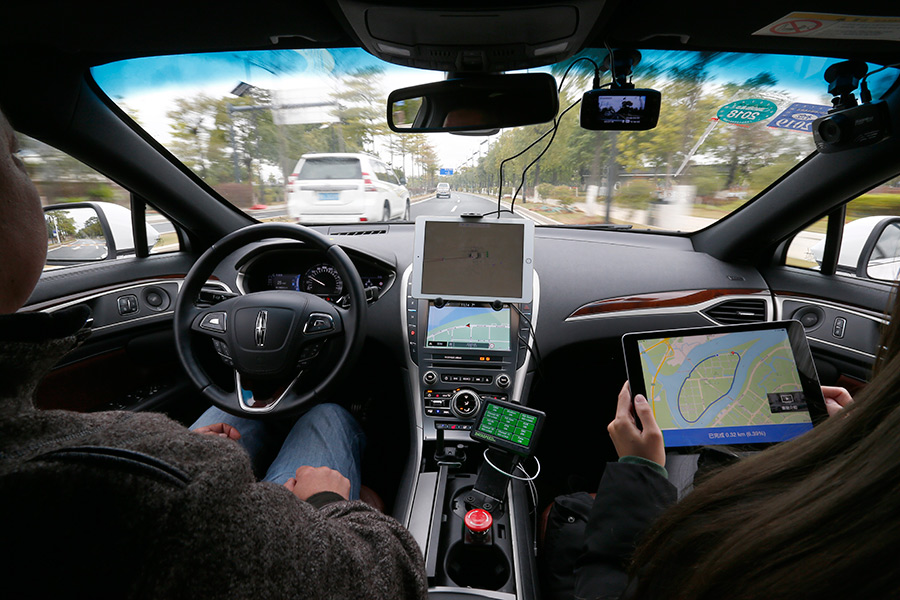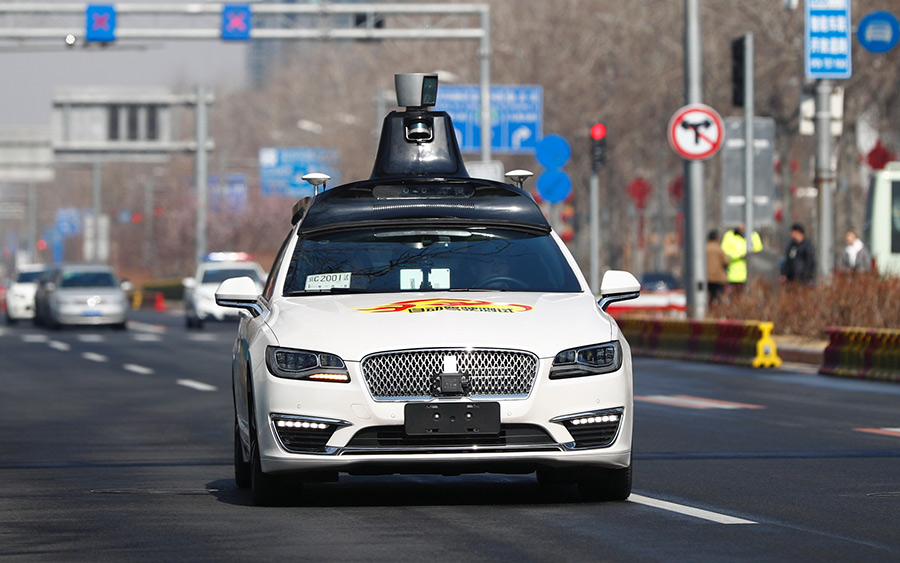Autonomous car makers hit brakes


Road death via Uber vehicle causes companies to rethink their testing strategy
Everybody knows, clearly or vaguely, that someday our cars will drive us around autonomously, but their time of arrival has been a heated topic. While the optimistic argue such cars are only three to five years away, many others insist it may take 10 years for them to become a reality.
The conservative estimate seems to be gaining an upper hand after an autonomous Uber car killed a woman in the United States last month when she walked her bicycle across the street. It was the first fatal crash involving a self-driving car being tested.
Uber soon suspended its tests of autonomous cars and Japanese automaker Toyota followed suit by halting such testing on public roads in the US. Tests in enclosed grounds continue. Many other tech companies and automakers, including General Motors and Ford, have so far not been disturbed by the accident.
Yet the accident has raised the concerns that the current technology may have many problems to solve, although it is agreed that in the long run autonomous cars will be safer because, unlike people, cars will not grow tired or distracted.
"There is no doubt that ultimately autonomous cars will do a better job than us," said Cui Dongshu, secretary-general of the China Passenger Car Association.
"But this accident sounds a timely warning that currently we cannot put all our faith in the technology, and we still need a lot more work to improve and test it."
In China, internet search giant Baidu has probably the most aggressive campaign regarding autonomous driving. It established its intelligent driving unit in late 2015 and unveiled its Apollo last year, an open platform that is said to help its partners develop their own autonomous driving systems.
According to Baidu, the platform has attracted many Chinese and international partners, including BYD, Ford, Microsoft and Daimler, the parent company of Mercedes-Benz.
Apollo is expected to fully support all four major computing platforms: NVIDIA, Intel, NXP and Renesas this year.
Days before the Uber accident, Baidu Chairman and CEO Robin Li said fully autonomous vehicles on truly open roads are only three to five years away.
That is a lot sooner than predicted by Miao Wei, minister of industry and information technology, who said it would only be reality in eight to 10 years and explained that safety should be a top priority.
"I am more optimistic and believe that we might achieve that goal ahead of schedule," Li said.
His remarks came one month after a fleet of more than 100 vehicles with Baidu's Apollo system drove themselves across the Hong Kong-Zhuhai-Macao Bridge as one of the opening episodes in this year's CCTV Spring Festival Gala, offering an audience of 1.1 billion a glimpse of its technology.
The vehicles included sedans from BYD, buses from King Long as well as road sweepers and logistics cars from Beijing Idriverplus Technology.
With the help of the Apollo system, King Long is scheduled to mass produce autonomous buses that run in designated areas as early as July.
JAC Motors and BAIC Group will each roll out Level 3 self-driving cars featuring the Apollo system in 2019, with Chery Automobile following in 2020.

According to the Society of Automotive Engineers, Level 3 cars can manage most aspects of driving, including monitoring the environment, but the driver must be available to take over at any time.
Some carmakers are pushing forward their own autonomous vehicle campaigns. Among others, SAIC Motor inked a deal with Intel earlier this year to develop software for self-driving cars. BYD is working on self-driving technologies itself, as well as in cooperation with Baidu.
Yet Zhu Jun, general manager of Shanghai E-propulsion Auto Technology Co, an SAIC Motor subsidiary, does not expect affordable cars with "real autonomy" to drive into daily life within 10 years because of technological issues and costs.
"By real autonomy, I mean at least cars at Level 4 or above," said Zhu.
According to the Society of Automotive Engineers, a Level 4 vehicle can drive itself almost without any human interaction, and a Level 5 vehicle can drive itself without human interaction on any road.
Beijing Electric Vehicle Co has a similar timeline. It plans to finish developing and testing fully autonomous cars before 2025, but said they are unlikely to hit the road in large numbers before 2028.
Those estimates are in line with the view of PwC consultancy subsidiary Strategy&, which predicts that highly or fully autonomous cars will become a reality in daily lives from around 2027.
Policymakers in China are paving the way for development of the technology that is believed to take center stage in future transportation.
Local authorities in Beijing released the country's first guideline on road tests of autonomous vehicles in December and unveiled a closed testing ground for autonomous cars in February.
The 13-hectare facility, composed of up to 100 different road conditions and situations, is the first of its kind nationwide, according to the Beijing Daily newspaper. The capital city is scheduled to open a second, larger one in June.
Developers must pass tests up to 5,000 km in such closed facilities before they can go on to conduct road tests, according to Beijing Electric Vehicle Co.
Currently working on Level 3 autonomous functions, BJEV said it will start testing its model, Lite, in April in the closed facility.
Local authorities in several other cities, including Shanghai and Chongqing, came up with regulations on self-driving car tests, since the country unveiled its ambition.
China expects cars with some autonomous functions to account for half of new vehicles sold by 2020, according to a guideline released by the National Development and Reform Commission in January.
In order to improve and perfect the legal system for self-driving technologies, the government will speed up its drafting of regulations for public road tests of autonomous driving and revise the current road safety regulations "when conditions are mature", according to the plan.
Progress is made in infrastructure as well. Zhejiang province will finish building China's first expressway that fully support autonomous driving before 2022, according to a Xinhua News Agency report.
Some industry insiders urge players in the segment to take a gradual approach to improve the technology.
Wu Zhixin, vice-president of the China Automotive Technology & Research Center, suggested that companies should first promote widespread use of lower-level functions, like autonomous parking, which is easy to realize in simple scenarios like parking lots.
"If we promote them, then more people will use them. When more people use them, carmakers will have returns on investments so they will have the money to invest further in research and development."
Yale Zhang, managing director of the Shanghai-based consultancy Automotive Foresight, said China may gain a head start in autonomous driving based on a combination of factors.
"In the past two years, we have seen more professionals in artificial intelligence and other cutting-edge technologies, the government is placing a lot of emphasis on it, and Chinese people are open to such new technologies, so it is likely for China to stand out."
TUV Rheinland, an international quality and safety testing service provider, has found that the Chinese public is more optimistic about autonomous driving, based on a survey of more than 1,000 licensed drivers ages 18 and above in China, Germany and the United States.
The findings, which were released in February, show that more than 63 percent of respondents in China believe driverless cars will increase road safety, while the figure is 34 percent in Germany and the United States.
But the respondents said they wish to be able to decide for themselves when to let a car drive autonomously and when to control it themselves.
Fan Feifei contributed to the story.



































